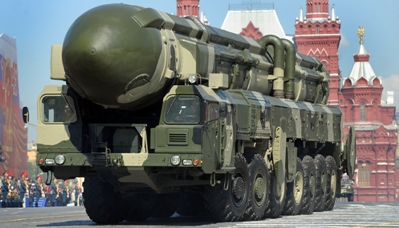According
to the translation of an article appearing in the Russian newspaper
Suvorovskiy Natisk on July 17, the Vostok 2010 Russian military
exercise concluded with a simulated a low-yield nuclear strike. This
simulated strike is consistent with the Russian policy of considering
the use of non-strategic (tactical) nuclear weapons in regional
conflicts where up to that point only conventional weapons would be
used.
As the United States Senate is in the midst of considering the New Strategic Arms Reduction Treaty (New START) arms control agreement with Russia, the Senate should understand the important linkage between the Vostok exercise and New START in the minds of the Russian leadership. According to unclassified sources, the Russians have a many-fold advantage in tactical nuclear weapons over the U.S. The Russian government wants to use this advantage to intimidate its neighbors in Eastern Europe, including those that are NATO allies of the U.S. Specifically, Moscow sees this as forcing the U.S. to recognize Russia’s exclusive sphere of influence in this region and to weaken its security commitments to its allies.
The problem for the U.S. is that the Russian position seeks to undermine the U.S. policy of extended deterrence in the European theater. This is where Senate consideration of New START comes into play. The Russian position can succeed only if Russia can maintain parity with the U.S. in the area of strategic nuclear arms and curtail the U.S. missile defense program. New START codifies both of these outcomes in favor of Russia. Regarding offensive strategic nuclear weapons, New START will reduce the U.S. force down to levels that are consistent with Russian capacity. Regarding missile defense, Russia was successful in getting language in the preamble of New START that commits the U.S. government not to develop or deploy missile defense capabilities that Russia finds objectionable. The Russian government, in order to strengthen the commitment regarding missile defense, has issued a unilateral statement that informs the U.S. that it will withdraw from New START if the U.S. does not limit its missile defense program in accordance with Russia’s views. The Obama Administration, for its part, has told the Russians that it has no intention of pursuing missile defense capabilities that Russia will find objectionable.
As a result, New START serves to weaken the U.S.-led alliance structure. In turn, this raises the risk of Russian military intervention in what Russia chauvinistically calls its “near abroad.” Such aggression has already taken place against the Republic of Georgia. Finally, this overall strategic imbalance, as demonstrated by the Vostok exercise, increases the risk of the use of nuclear weapons in a conflict. The Senate needs to ask itself whether these are desirable outcomes as it considers granting its consent to the ratification of New START.
As the United States Senate is in the midst of considering the New Strategic Arms Reduction Treaty (New START) arms control agreement with Russia, the Senate should understand the important linkage between the Vostok exercise and New START in the minds of the Russian leadership. According to unclassified sources, the Russians have a many-fold advantage in tactical nuclear weapons over the U.S. The Russian government wants to use this advantage to intimidate its neighbors in Eastern Europe, including those that are NATO allies of the U.S. Specifically, Moscow sees this as forcing the U.S. to recognize Russia’s exclusive sphere of influence in this region and to weaken its security commitments to its allies.
The problem for the U.S. is that the Russian position seeks to undermine the U.S. policy of extended deterrence in the European theater. This is where Senate consideration of New START comes into play. The Russian position can succeed only if Russia can maintain parity with the U.S. in the area of strategic nuclear arms and curtail the U.S. missile defense program. New START codifies both of these outcomes in favor of Russia. Regarding offensive strategic nuclear weapons, New START will reduce the U.S. force down to levels that are consistent with Russian capacity. Regarding missile defense, Russia was successful in getting language in the preamble of New START that commits the U.S. government not to develop or deploy missile defense capabilities that Russia finds objectionable. The Russian government, in order to strengthen the commitment regarding missile defense, has issued a unilateral statement that informs the U.S. that it will withdraw from New START if the U.S. does not limit its missile defense program in accordance with Russia’s views. The Obama Administration, for its part, has told the Russians that it has no intention of pursuing missile defense capabilities that Russia will find objectionable.
As a result, New START serves to weaken the U.S.-led alliance structure. In turn, this raises the risk of Russian military intervention in what Russia chauvinistically calls its “near abroad.” Such aggression has already taken place against the Republic of Georgia. Finally, this overall strategic imbalance, as demonstrated by the Vostok exercise, increases the risk of the use of nuclear weapons in a conflict. The Senate needs to ask itself whether these are desirable outcomes as it considers granting its consent to the ratification of New START.
Author: Baker Spring


No comments:
Post a Comment